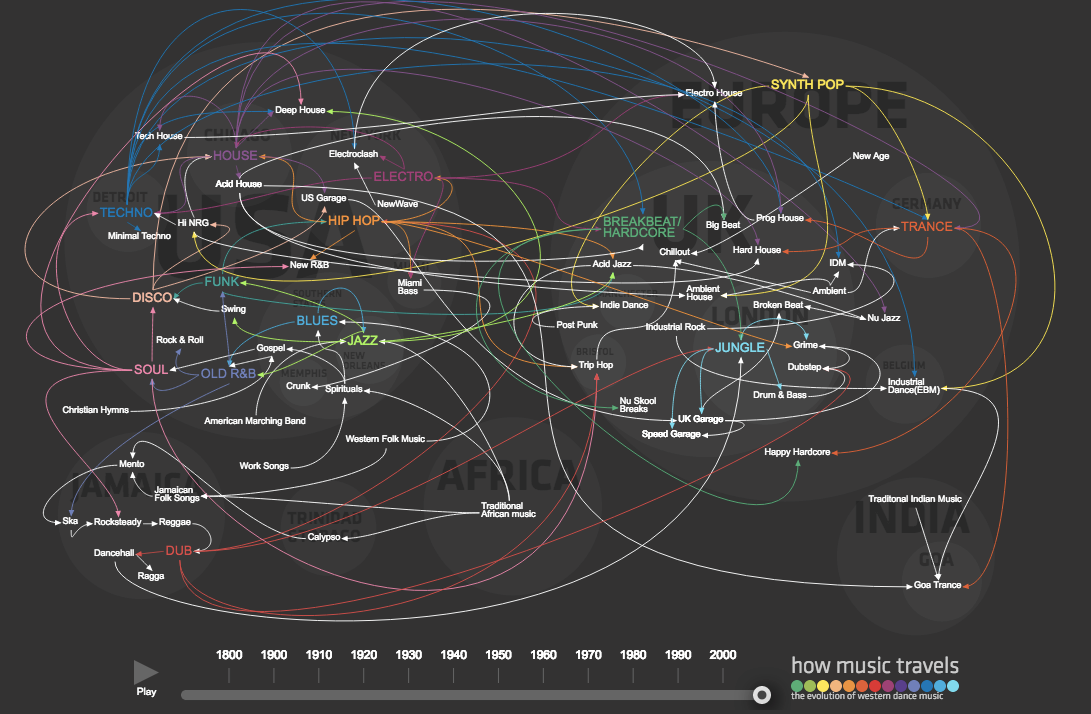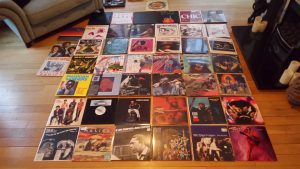
October 13, 2016, by Claire Henson
Music and Black History Month 2016
Dr Vince Wilson, School of Life Sciences, talks about the music events happening during Black History Month.
Music, whether experienced live, on recorded format or as accompaniment to TV or film, is an important part of British life. Practically everyone has found themselves dancing at some point, at family events or out with friends, even if they did not want to. Such is the all-encompassing nature of music, the holiday company Thomson has produced a short animated presentation titled ‘The Evolution of Western Dance Music’(1) that purports to cover developments over the last 200 years. While there are some glaring omissions, particularly in terms of the important role of UK during 1960 to1980, two things stand out to me. First, the pivotal role played by West Africa, America and the West Indies in the development of dance music before 1960. Second the explosive proliferation of genres and sub-genres of music over the last 15 years – testimony to the importance of music amongst young people. During the next few weeks the University of Nottingham will be supporting three music-related events, as part of Black History Month, that touch upon different forms of Dance Music.
Akala – The Emcee
On the afternoon of October 25th Akala, who is playing The Maze that evening, will give a talk at the Lakeside titled ‘The Evolution of the Emcee’. Akala is a young British rapper and poet who has received MOBO and BAFTA awards in recognition of contribution to the music and arts scene in the UK. He manages to combine touring and recording as an artist with frequent appearances on TV as a commentator on subjects as diverse as the link between Shakespeare and Hip Hop, racism in the UK and male identity. He has also given talks at several universities and last year spoke about early African History at the Oxford Student Union. Amongst his considerable achievements to date is the Hip Hop Shakespeare Company(2), founded as an educational medium that serves to promote Shakespeare to school children and place Hip Hop in a wider, non-musical social context. His talk about role of the Emcee nicely ties in with a recent BBC 4 documentary called Hip Hop World News(3) that presents a refreshingly positive view of a music form often disparaged in the press. To my mind, there are obvious parallels between Akala and the American poet and songwriter Gil Scott Heron, both have chosen a music-based idiom for the use of words to better understand history and raise consciousness for all people.
Mandeep Samra – Sound System Culture and Vinyl
Over the summer the British Library held an exhibition about the rise of Punk music in the mid 1970s and its lasting social and cultural impact. The season of talks associated with the exhibition culminated in the celebration of the Rock Against Racism(4) campaign. This movement was borne out of the marginalization of white working class kids, inspired by the anti-establishment music of the New York Dolls and Velvet Underground, and the black children of immigrants listening to Dance Hall music of Jamaica. Both groups understood the world through a love of vinyl and a shared need to oppose right wing, fascists (eg. National Front). It is there on the Thomsons ‘Evolution of Western Dance Music, around 1975, with a line that connects New York, the UK and Jamaica. It was also celebrated last month by another event at the British Library called Punky Reggae Party(4), that I am confident featured music by the Clash, Junior Murvin (Police and Thieves), Sly and Robbie and Public Image.
Mandeep Samra brings to Rough Trade (Broad Street) on Sunday October 23rd a day of Dance Hall Music and culture inspired by her early years experiences in Huddersfield(5), that nicely intersects with the Thomsons view of Western Dance Music. In the late 70s and 80s Jamaican artists coming to play in the UK would obviously make their way to gigs in the major urban areas of London, Birmingham Manchester and Bristol, but there was a recognition that no tour was complete unless they also played in Huddersfield. This small, market town in Yorkshire incubated a scene that grew out of Blues Parties and encompassed people of all backgrounds through a love of dance and vinyl(6). Before the advent of CDs, mp3s and streaming, vinyl (and radio) was the way that people experienced the music of other cultures and as a medium it needs to be celebrated.
Come down to Rough Trade (2-10pm) to dance and feel the bass. You can also pick up plenty of vinyl. My turntable broke the best part of four years ago and I have not got round to getting it fixed, but this has not stopped me from buying records. The attached picture shows, laid out on the floor of my lounge, all the vinyl collected but which remain unplayed. I am not exactly sure why I still part with money and not feel the bass, but I do recognise it as a trait/obsession that is going to cost me a lot more. Indeed, since taking the picture two weeks ago I have added another two LPs.

Natalie Duncan, Yazmin Lacey and Raphael Blake
Everyone knows that the most memorable moments in music are experienced live. Before the advent of vinyl and radio it was live performance shared by groups of people and word of mouth that allowed for knowledge of music and dance forms to spread. The live music event at Nottingham Contemporary on Saturday October 15th features three performers. Raphael Blake is a spoken word performer and visual artist gaining international recognition, while Yazmin Lacey is an up-and-coming singer recently signed to Gilles Peterson’s record label. Both are based in Nottingham and have been prospered from the vibrant music scene associated with the city. The headline act, Natalie Duncan, grew up in Nottingham. However, her performances here in the past two years have left a deep impression on me, that goes well beyond any comparison with Alica Keys and Nina Simone. Two years ago at the Nottingham Contemporary she performed, in turn, with a choir, a band, a string quartet and a rapper, and managed to stay centre of attention in each musical setting. Very few artists possess this type of musical versatility. At the Djanogly Theatre last year near the end of her set she gave a short, very emotional talk about the Black Lives Matter campaign and then launched into a blistering version of Kendrick Lamar’s ‘Alright’, a song I had not heard before. It has stayed in my memory since. You can catch a recorded version of her re-interpretation of his iconic track on You Tube(7).
Over the next few weeks you have the opportunity to experience, via spoken word, vinyl recordings and live performance, a snapshot of the impact of black artists on British society and Western Dance Music.
- http://www.thomson.co.uk/blog/wp-content/uploads/infographic/interactive-music-map/index.html
- http://www.hiphopshakespeare.com
- http://www.bbc.co.uk/programmes/b07vxmxt
- https://www.bl.uk/events/punky-reggae-party-the-story-of-rock-against-racism
- http://soundsystemcultureblog.tumblr.com/
- https://www.theguardian.com/music/2014/jul/31/champion-sound-huddersfield-ruled-british-reggae-scene
- https://www.youtube.com/watch?v=kxPeEFlh53Y
No comments yet, fill out a comment to be the first

Leave a Reply